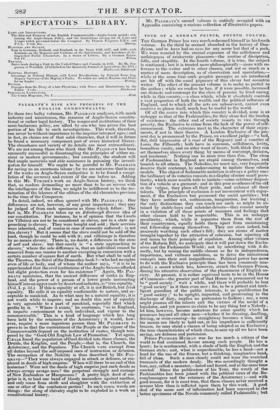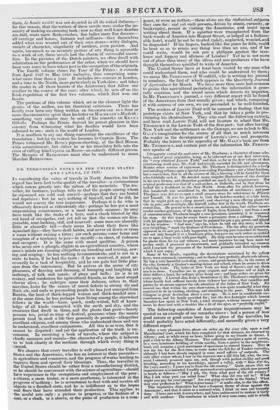TOUR OF A GERMAN PRINCE, FOURTH VOLUME.'
THE German Prince has very much redeemed himself in his fourth volume. In the third he seemed absorbed in the history of Dan- dyism, and to have had no eyes for any scene but that of a park. We were wearied by the eternal exposure of the selfishness and nothingness of aristocratic pleasures—the routine of dissipation, folly, and stupidity. In the fourth volume, it is true, the subject is continued ; but it is treated more philosophically—more with re- ference to the writer and to other classes, and not so much as a matter of mere description, as of observation and speculation,— while at the same time such graphic passages as are introduced are hit off with the usual piquancy of this- clever but eccentric writer. The effect of the present volume is to make us partial . to the author ; while we confess he has, if it were possible, increased our distaste and contempt for the class of persens he lived among while in this country,—a class which, while it absolutely controls a vast proportion of both the wealth and the political influence of England, and to which all the arts are subservient, cannot even contrive to please itself, Much less be useful to the world. Of all the castes into which this country is divided, none is se unhappy as that of the Fashionables, for they alone feel the burden of existence : the other end of society resorts to vice through poverty, the Exclusive to crime from the lack of the power of self- amusement. The extremes meet in the character Of their enjoy- ments, if not in their theatre. A London Exclusive of the pre- sent day is pronounced by the Prince, an excellent judge—"a bad, flat, dull impression of a roué of the Regency and a courtier of Louis the Fifteenth: both have in common, selfishness, levity, boundless vanity, and an utter want of heart; both think they can set themselves above every thing by means of contempt, derision, and insolence." Nothing can be more true than this. The class of Fashionables in England are stupid among themselves, and boorish to all others. The Nobodies, we must say, very frequently deserve their contempt, by endeavouring to imitate these odious models. The object of fashionable ambition is always a paltry one: the brilliancy of its votaries consists in a display of some small pecu- liarity, which mere wealth toils to imitate—some arbitrary disposi- tion of a vehicle or a garment : and in this poor avoidance of the old or the vulgar, they place all their pride, and exhaust all their talents. The principle of exclusion is not inconsistent with enjoy- ment, if the Exclusives but possessed the social qualities ; but they have neither wit, enthusiasm, imagination, nor learning : the only distinctions they can reach are such as might be at- tained by stable-boys and cabriolet-drivers—they consist merely in a violation of all those points of manners and feelings that other classes hold to be respectable. This is an unhappy peculiarity, which, while it separates them from the rest of their countrymen, equally holds them apart from maintaining real fellowship among themselves. They are stars indeed, but anxiously watching each other's fall ; they are atoms of matter brought together by the attraction of cohesion, but rejecting all. real union by their principle of repulsion. Among other virtues of the Reform Bill, we anticipate that it will put down the Exchn- sives and the Fashionable World ; not by interfering with it di. rectly, but by raising the middle classes so far in independence, importance, and virtuous ambition, as to drive the industrious ennuyes into their real insignificance. Political power has more to do with the Exclusive principle than has been commonly imw. gined ; a secret which has, however, struck the German Prince, during his attentiv.e observation of the phenomena of English so- ciety. At present, it is rather equivocal taste to be in the House of Commons—the greater part of that House is pronounced not to be "good society :' wait a while, and there will probably be less "good society" in it than even now; for, to be a patient and intel- ligent guardian of the public interests, is no qualification for "good society '-" to be upright, impartial, and persevering in the discharge of duty, implies no pretension to fashion ; nay, a man might possess all the talents and the virtues of the model of a legislator, and yet possess no claim to be any thing but a Nobody, let him, however, become notorious for some quality which he possesses beyond all other men—whether it be dressing, duelling driving, or crirn-conning—he straightway becomes a lion, and if his means are likely to hold out, or his impudence is sufficiently brazen, he may stand a chance of being adopted as an Exclusive; the true characteristics of which class, to sum up all we have been, saying, are dulness and pretension. • Prince PUCHLER MUSKAU was far too much a citizen of the world to find continued favour among such people. He has a heart; he is sentimental, with a shade of both the English and the German style; and, what is unpardonable, he has a head—not a head for the use of the friseur, but a thinking, imaginative head, full of ideas. Such a man clearly could not wear the wretched trammels of the modern dandy. He was accordingly thought a bore, nay, called a monster,—hated and feared, and at the same time courted. Since the publication of his Tour, the wrath of the Fashionables has been joined with the political virus of the Bo- roughmongers and the retainers of the Aristocracy ;—and with good reason, for it is most true, that these classes never received a severer blow than is inflicted upon them by this work. A good deal of the same sort of information had been conveyed in the better specimens of the Novels commonly called Fashionable; but there, la haute soeiete was not depicted in all its naked dulness,— for this reason, that the writers of these novels were under the ne- cessity of making an amusing book; now as they well knew dandies are dull, routs mere flesh-crushes, fine ladies mere fine dresses— all carriage and horses footmen and milliners—they themselves added silt was wanted out of their own stores—witty dialogue, variety of character, singularity of incident, even passion. And again, inasmuch as an accurate picture of any thing is agreeable as a work of art, these novels had the charm of successful execu- tion. In the pictures of the Dutch painters, we often dwell with admiration on the performance of the artist, when we should have been very sorry to have taken part in the occupation of the originals. The fourth volume closes the Tour of the Prince : it extends from April 1827 to May 1828 inclusive, thus comprising some- what more time than a year. It includes two seasons in London, and a tour to the North, more particularly in Yorkshire; and takes the reader to all those haunts of the Aristocracy that follow one another in the course of the year; 'after which, he sets off on the Irish expedition of the first two volumes, which first won our hearts.
The portions of this volume which set in the clearest light the genius of the author, are his theatrical criticisms. There has hardly ever been any thing written on SHAKSPEARE in a finer or more discriminative spirit than his letter on MACRE ADY'S Macbeth : something very similar may -be said of his remarks on KEA N'S Othello. ''Perhaps the Prince derived his purest pleasure in this country from witnessing what his dandies would have been ashamed to see: such is the world of London.
It is needless to say any thing concerning the excellence of the translation : but let us restore his honours to Captain Ross. The Prince witnessed Mr. Ross's pigeon-shooting, at the Red House, • with astonishment; but either he or his translator falls into the error of calling him Captain DE Roos—an entirely different person.
The Marquis of BERESFORD must also be understood to mean Marshal BERESFORD.



























 Previous page
Previous page